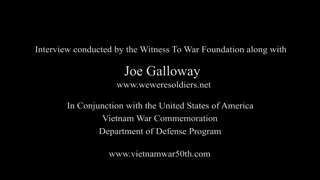4:05 | Jim Lawrence could only watch as A-1E Skyraiders turned the tide at the battle of Landing Zone Albany. He'd been shot in the head and couldn't move his legs. After evacuation, the first doctor he saw had a bedside manner that was lacking. Part 5 of 5.
Keywords : Jim Lawrence Vietnam Ia Drang Valley A-1E Skyraider Frank Henry napalm Smokey the Bear C-47 flare medivac Pleiku Quinn Yan Qui Nhon MASH Clark AFB rehab Bob Hope Hubert Humphrey Troy AL Joe Galloway

After surviving the plebe system at The Citadel, Jim Lawrence became a platoon leader in the reformed 1st Cavalry, the Army's new air mobile division. They were the first sizable unit sent to Vietnam, but they didn't expect anything more than an "action," certainly not a war.
Jim Lawrence had intensely trained his reconnaissance platoon and had them armed and ready when they reached Vietnam, but what they found was vendors at the harbor selling boots and toys. Their first job was to carve a base camp out of the wilderness in the Central Highlands.
He was wary of the Vietnamese civilians who were workers at the unit's base camp, but Jim Lawrence was fully confident in the tightly knit group of officers and men who had bonded on the month long voyage to the country. His best friend, Don Cornett and his sergeant, Ron Benton, were two of them.
When you carve a base camp out of the wilderness, you have to have an officers club. The guitar was supplied by Jim Lawrence, who drew on a deep appreciation of folk music.
The North Vietnamese had lured the Americans into a trap by attacking a Special Forces camp and setting up an ambush. Col. Hal Moore's air mobile unit was in a fight for its life and Jim Lawrence could hear it in the distance. His unit was called in for support and, after two days of fighting they were told to move out on foot. Part 1 of 5.
There was a series of mistakes made during the ill-fated march to Landing Zone Albany. Jim Lawrence muses over the mindset, the lack of tactical movement and other problems as the column of soldiers moved through unknown territory. When company commanders were called forward, he gave the men a break. Two big mistakes. Part 2 of 5.
The battle of the Ia Drang Valley was not yet over. There was a column of men from the 7th Cavalry marching to a site called Albany for pickup, and as they neared the landing zone, the jungle erupted in vicious gunfire. North Vietnamese were waiting for them. Amazingly, as Jim Lawrence fired at the enemy who was charging his position, he was ordered to cease fire. He disobeyed that order. Part 3 of 5.
He was pinned down by enemy fire when he suddenly realized that, with his captain called to the front of the column, he was the leader of a company in the middle of an ambush. Jim Lawrence knew he had to get them moving and away from there so he stood up and at that moment, a sniper fired. Part 4 of 5.
It was the most horrific, yet the most important day in his life. Jim Lawrence says the Battle of Landing Zone Albany made him the man he is today. As he sat in the hospital recovering from his wound, he read the casualty list from the battle and checked off over sixty names of men he knew personally.
As a returning Vietnam veteran, Jim Lawrence disappeared into his own life, along with all the others who were ignored or worse by the public. He is happy about the respect returning vets get today, but is disturbed by what he considers the same mistakes being made by politicians.
Jim Lawrence grew up in the segregated South with a passive acceptance of the situation. But in Vietnam, where it was life or death every minute, there was no place for racial animus. As he was being evacuated with a serious wound from the battlefield, something happened which changed his outlook forever.
His experience in Vietnam taught him something about what it means to be an American, says Jim Lawrence. He reflects on the death of his friend, Don Cornett, and the effect it had on all the lives connected to him. Multiply those numbers by the over 58,000 names on The Wall and you get an idea of the true scale of the tragedy of war.